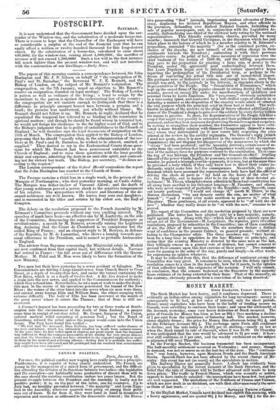FRENCH POLITICS.
Paris, January 16. For once, the pelitical eonflict now waging here really involves a principle. Furthermore, it is capable of being clearly understood. The French, are young in the management of a mixed form of government, and the difficul- ties attending the, division of its functions betieen two bodiee—the ligielative and the executive—are habitually more productive of discord than will be the case should the existing constitution endure ten years longer. Bub the present struggle between the President and the Assembly is really not for positive power; it is, on tiro-pert of the latter, one fur existence. Up to July last, no hostility Mcsailed-hetweers;" the niejpriq.": and Louis Napo- leon in the Assembl , whatever quarrels were gding on among their parti- sans out of doors. So far from it, they went hand in hand in measures of repression and coercion as addressed to the democratic element ; the Execu- tive prosecuting " Red" journal imprisoning zealous advocatei of Demo- cracy, displacing too declared Republican Mayors, and other officials in the provinces, disbanding over Radical National Guards, forbidding the sale of popular newspapers, and, in conjunction with the Legislative As- sembly, disfranchising one-third of the electoral body voting for the national representatives. This friendly cooperation, obSerre, prevailed for many months ; insomuch that General. Cavaignac, in the discussion which has just taken lace in the bureau of which he is a member relative to M. ReMusat's proposition, reminded "-the majority" (far so the combined parties, ex- clusive of ' thel,peirche, are now termed) of the sudden 'change m their sentiments toWards the President ; contrasting it with their previous submissive course. In point of fact, these Measures of repression were the chief business of the session of 1810-50, and' 4 Ili acquiescence gave to the propositiOn for gTanting a la g of money to the President, sealed the apparently good and 1 .1-noWff incidents ottlmXe'reNri on the An' Satory a , ed, ed,ditIerialeri- denceof the Proohlet4,o,deXign to gmn over" ' soldiery feretillegice within his3ireans to practise. In short„the Representatives of the Peoplefelk that a coup d'etat might very possibly be attemptekand their political:mister:are com- promised, unless they took measures for protecting themselves against surprises. In seeking to strengthen theirs-position:the Committee appear to have culti- • rated a-mem frieridly,relation witheietneral-Changerniers-,(himself a stem- ber,) whom they interrogated (as it now 'Cornea-Ida) respecting the cries uttered, nl the review by, the .cartilrY'regiMentss., The General's reply, (which I nerri not quote, since it is now published in the minutes of the Permanent Conic rision) did not disguise his disapproval of the manoeuvres by which the " iiints "_.hifd been produced ; and the Assembly derived a certain sense of se- cueity from the conviction that General Changarnier would resist any applica.- lion of the military force for purposes eentrary to the constitution. Then came = pf war between ,the Irresident and-tlid General-iirchief. Aft:tiling of the power whic.h„legally, he posseasia, to remove the stithieckedeOm- mender, he gamed a triumph overhis opponents, it is true„ but at the same time ke, priqQked a body which, if they onlyk-ne*Ihow to direet'their Conise'ju- dieeouslys might make him feel the consequences. Meanwhile, the appre- hensions which have possessed the,representativehWy hare-hatirtha:effect of driving the chefs de partiA0 " lay bold .on_the _fiorns_eL the alter"- i.e. the Republic, and to declare that to be the object of their devoted at-. tachment ! M. Tillers, WhOSalukeintit adlierdiaktO theactual constitution has all along been ascribed to his Orleanist longings—IL Piscatery, and others, who 'were never suspected of partiality to the ftepeWienons•forsooth-, come out heart : partisans. " I would not change it," EMOth 3L niers, in the Bureau discussions, "for any dynasty under the •sun, no matter of what branch" ; "and I would even make sacrifices to preserve it," cries M. Placatory. -Thew gentlemen, at all•events, appeared to be "oft' with the old love " '- whether they really desire to be "on with the-new," remains to be proved. The te t of the Committee and the resolution proposed by them are now published. The latter has been adopted only hv a bare majority, namely, eight against. seven. Along with this—which deals a mild censure Upon the recent act of the Government-:.-M. Lanjuinais, the reporter, gives two other reselutions proposed by' minorities in the Cominittee; one of theie consisting of six, the other of three members. The six members declare a distinct want of confidence in the present Cabinet, on general grounds, Without al- luding to the Changarnier. 'riffair. The three members say, "that having been for a-long time in tion to the lute' Ministry on principle; - and seeing that the existing Ministry is directed by the same men as the last, they willingly concur in a general vote of distrust, but cannot consent to ground their censure upon this first exercise of their power." Two members were for passing to the order of the day, purely and simply-.4.0 other words, for expressing no opinion whatever. It may be collected from this, that the difference of sentiment among the Committee was very great. It remains to he seen, when the debate upon the resolution comes to a close in the Aasembly, how far it meets, in the opinion of that collective beds.' the exigenciei of the occasion. I will only remark, in conchision, that the censure bestotred on-the-Executive by the majority ibears evidence of its being• extorted by their fears: That of the minority, on the contrary, obviously proceeds from a conviction of its being deseried.'


























 Previous page
Previous page